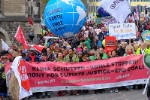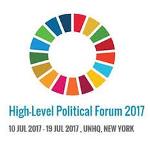Global Policy Watch
Published on Tue, 2017-11-28 16:13
“Data is the new Gold” headlined a 2014 article in the business press on the marketing power it offers. “Each click, like, and share creates new data in the world, much of which can be used to deliver relevant marketing information and bring increased value to consumer audiences.” Picking up on the potential of so-called Big Data to measure national and global progress on development goals agreed in the 2030 Agenda for Sustainable Development, the 2030 Agenda has driven a variety of new initiatives, bringing together a vast array of global corporations, foundations, and CSOs ready to mine this new seam.
Three of these new data initiatives are the Global Partnership for Sustainable Development Data (GPSDD), Data 2X and the Digital Impact Alliance, all of which are housed at the United Nations Foundation (UNF) and which therefore claim only to advance UN goals and priorities, not the UN itself. Most of them are financed by a few major donors, public and private.
|
Published on Wed, 2017-11-15 09:40

Photo: Wolfgang Obenland
|
How can we ensure that implementation of the Paris Agreement truly helps foster more just and sustainable development, and what is standing in the way of this progress?
It is no secret that a dual relationship exists between climate change and sustainable development. While climate change influences the environment and has deep impacts on human living conditions and therefore affects the cornerstones of social, economic and environmental development, the way society chooses to develop has implications on greenhouse gas emissions.
|
Published on Wed, 2017-10-25 21:16
The World Bank, together with the International Monetary Fund (IMF) and the development banks, have been proclaiming since 2015 that “to meet the investment needs of the Sustainable Development Goals (SDGs), the global community needs to move the discussion from ‘billions to trillions’” — that is from billions in official development assistance (ODA) to trillions in investments of all kinds: public and private, national and global, in both capital and capacity.
|
Published on Mon, 2017-08-07 11:04
Reflections on the 2017 United Nations High-Level Political Forum on Sustainable Development. In his opening remarks, the UN Secretary-General said that 20 years ago “there was the idea that globalization would not only increase global wealth, but that it would trickle-down and would benefit everybody in our planet”.
He went on to describe that at the present time, “globalization and technological progress have dramatically increased global trade and global wealth. It is true that the number of absolute poor has been reduced and that living conditions have improved all over the world but it is also true that globalization and technological progress together have been factors in the increase of inequality”.
|
Published on Fri, 2017-02-24 08:27
The current model of UN development assistance—operating country by country, and issue by issue, with priorities heavily driven by individual donors and their interests—is no longer fit for its intended purpose.
The ambitious vision of the 2030 Agenda for Sustainable Development challenges the UN development system to fully respond to the inextricable links across countries and among social, economic and environmental concerns. This is not just an issue of greater efficiency and effectiveness within existing arrangements. It is a question of how the UN development system can meet the high demands of new commitments aimed at transforming the course of development so that it is equitable, sustainable and aligned with human rights, and remains within planetary boundaries.
|
Published on Mon, 2016-12-19 14:07
In an unprecedented and historic move, the Sixth Committee of the UN General Assembly recently granted observer status to the International Chamber of Commerce (ICC). The resolution was submitted by France, Albania, Colombia, the Netherlands and Tunisia and was adopted during the seventy-first session of the General Assembly. The resolution sets out the ICC’s position as observer in the General Assembly from 1 January 2017 on.
|
Published on Fri, 2016-12-16 12:59
The "refinement" of the SDG indicators by experts can dilute the goals agreed by the governments, said civil society representatives as preparations advance to the 48th session of the UN Statistical Commission in March 2017. For example, under target 10.5, to improve the regulation and monitoring of global financial markets, the proposed indicator #10.5.1: “Adoption of global financial transaction tax (Tobin tax)” was changed to “Financial Soundness Indicators”, developed by the IMF.
|
Published on Sat, 2016-12-10 00:00
Since the of the Third International Conference on Financing for Development held in Addis Ababa, Ethiopia, the UN has continued to address global issues such as external debt sustainability and development, promotion of international cooperation to curb and recover illicit financial flows, raising domestic and foreign public and private investment, reaching commitments to official development assistance, critical analysis on proliferation of public-private partnerships for development, domestic resource mobilisation and tax justice, and sectoral financing (education, health, agriculture, etc...).
|
Published on Fri, 2016-11-11 19:43
As the first year of implementation of the 2030 Agenda for Sustainable Development concludes, the technical work at/of the UN continues to refine and agree on the global indicators to measure progress. This involves circulating selected indicators for consultation, adopting a lead agency to collect and submit the data and adopting an agreed methodology, as well as fundraising to increase the extent of data coverage and building capacity. At the same time, as this is a work in progress, many Member States have undertaken national initiatives to review the SDGs and incorporate them into national policy and budget processes.
|
Published on Wed, 2016-10-05 09:45
In order to intensify the effort to advance the 2030 Agenda for Sustainable Development, the UN is exploring financial solutions for the Sustainable better align the trillions of dollars of annual private investment with the sustainable development goals and their targets? Can this approach be prioritized with regard to long-term investments made with funds from multiple domestic and international sources? Can it be made to cover the full range of the 2030 Agenda – and might it reach into all countries, including the least developed and small island developing states?
|
SUSCRIBE TO OUR NEWSLETTER
Submit

|





